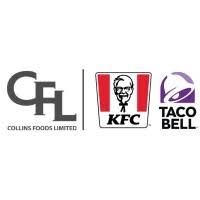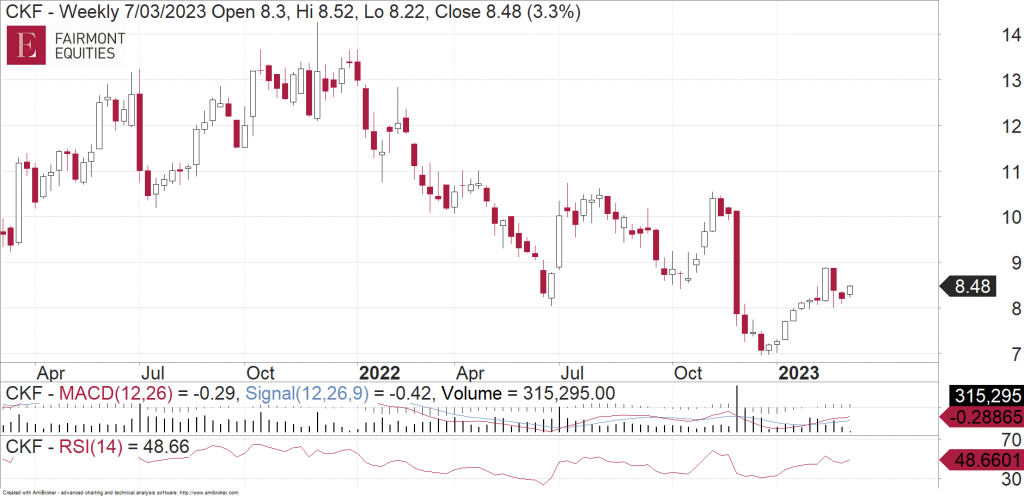Following the release of its interim results in late November, shares in Collins Foods (ASX:CKF) have de-rated on the back of margin concerns and a lack of progress with the Taco Bell brand. With the shares having shown signs of a recovery off its recent lows, we researched CKF in The Dynamic Investor in mid-February to assess whether there is scope for a more sustainable recovery, or whether CKF may be a value trap.
Overview of Collins Foods
Collins Foods is a Kentucky Fried Chicken (KFC) franchisee in Australia and Europe (Netherlands and Germany) with a total of around 280 KFC restaurants. The Company is also a Taco Bell franchisee in Australia.
CKF is the largest KFC franchisee in Australia. Both the KFC and Taco Bell brands are owned globally by Yum! Brands. CKF’s franchises are held through individual agreements with Yum! Brands and CKF are required to pay Yum! Brands annual loyalty payments.
KFC Australia is the main value driver for the Company, as it accounts for nearly 80% of group sales and a higher portion of overall earnings, given the recent improvement in KFC Europe and the relatively smaller number of Taco Bell restaurants.
Key Fundamental Drivers
Several Factors Supporting Sales growth for KFC Australia
Same Store Sales growth (SSSg) of 5.1% for the period 2 May to 16 October 2022 (1H23 – CKF has a 30 April balance date) was largely being driven by price and mix growth, with transaction count largely flat. SSSg in the first six weeks of 2H23 was +5.6%, with SSSg for 2H23 expected to be higher than this rate supported by a return of activity within high foot traffic areas. Notably, CKF’s competitor Restaurant Brands reported SSSg of +7.4% for the December 2022 quarter.
Sales growth for KFC Australia are also being supported by several factors, including i) Higher transaction volumes, ii) Successful partnerships with aggregators, iii) Store expansion plans running ahead of target and iv) Increased online penetration.
Margin Recovery for KFC Australia Pushed Out
EBITDA margin for KFC Australia in 1H23 was 15.8%, down from 17.8% in the 1H22. As a result of continued cost pressures (i.e. supply chain, poultry), the Company lowered its FY23 EBITDA margin guidance from 16-17% to 15-16% and indicated that a full EBITDA margin recovery could extend into FY25 and beyond. CKF expect menu pricing and procurement initiatives to mitigate further cost inflation pressure into FY24. Other levers to recover EBITDA margin include menu design and promotional activity, in order to improve transaction volumes.
In terms of menu price increases in Australia, CKF has aimed to take price at or below CPI to maintain its value perception, while in Europe it has made similar moves. However, management indicated that it is approaching price increases carefully, given that KFC remains a smaller player in the market relative to other QSR’s.
Margin pressure is also evident in the KFC division, perhaps to a greater extent than KFC Australia. While KFC Europe is maintaining strong levels of SSSg – driven by increased ticket (largely inflation) and increased transaction volumes – cost pressures are outweighing any benefit from sales growth, with the Company expecting further EBITDA margin contraction.
Taco Bell Continues to Underperform
By way of background, in early October 2018, CKF entered into a Development Agreement with Taco Bell (a subsidiary of Yum! Brands Inc.) for the roll-out of more than 50 new Taco Bell restaurants across multiple states in Australia between 1 January 2019 and 31 December 2021. The Development Agreement covers three Australian states (Queensland, Victoria and WA) and provides CKF with the right of first offer in relation to the establishment of new Taco Bell restaurants across the three states.
Unfortunately, the Taco Bell brand does not appear to be gaining as much traction as expected with consumers in Australia, with already-intense competition in the Mexican QSR segment, including Guzman Y Gomez, Mad Mex, and Zambrero. In 1H23, SSSg was -7.8% and remains loss-making as it struggles to win customer share of wallet. SSSg deteriorated further for the first six weeks of 2H23 (-8.5%).
The poor performance also resulted in CKF booking an asset impairment for eight Taco Bell restaurants over the period, with these stores not meeting management expectations. Further impairment is possible if revenue growth and EBITDA rates do not meet management thresholds.
The prospects for a turnaround are seemingly reliant on increased use of aggregators and increased/improved marketing. Initiatives include expansion of the partnership with Uber Eats, enhanced value-oriented pricing and marketing, upgraded food quality and increased investment from Yum! Brands.
Perhaps a reflection of the brand weakness for Taco Bell (and at same time, the strength of the KFC brand) is that CKF’s competitor Restaurant Brands is expected to take a similar approach to CKF and pause the rollout of its Taco Bell stores, with Restaurant Brands’ store rollout also heavily weighted to weighted to KFC over Taco Bell and CKF’s store expansion plans for FY23 in Australia (9-12 new stores) tracking ahead of the agreed target of 7-8 stores.
Balance Sheet Capacity Has Improved
Notwithstanding the slight increase in debt from the end of FY22 (due in part to payment for acquisitions), there is significant balance sheet headroom which is likely to be utilised on further growth opportunities as opposed to capital management. To this end, the Company has commented that it is open to Merger & Acquisition opportunities in Australia and Europe, in order to increase scale.
Fundamental View
While the shares are currently trading on a 1-year forward P/E multiple ~18.5x, we take a cautious view on CKF especially given that: i) The current multiple is unappealing in the context of EPS growth of ~2.5% over FY22-25 on a CAGR basis – with this rate of EPS growth factoring in a significant recovery in FY25 (i.e. ~+25%). In the absence of a large accretive acquisition, we struggle to see any catalysts for the shares over the short term, especially as:
i. Any recovery on the EBITDA margin profile across the Australian and Europe operations is likely to be pushed out further. This is given that there is downside risk to EBITDA margin estimates as a result of the likelihood that price increases (if implemented) may not be enough to offset further cost pressures.
ii. The lack of traction in the Taco Bell brand requires additional expenditure (i.e. marketing) and possibly additional capital investment (i.e. store refurbishments, enhancements, etc) and management time – which can be better utilised elsewhere within the CKF portfolio.
Charting View
There were some clear reversal signs on the chart back in early 2022 and CKF has been trending lower ever since. The bounce since the start of the year looks weak and we expect CKF to head to lower levels in the short-term. If it can hold above $7 and build a base, then we may start to get confident about a floor in a share price. But at this rate, it is likely to fall below that.

Michael Gable is managing director of Fairmont Equities.
Current share prices available here.
You can learn more about technical analysis in this article.
An 8-week FREE TRIAL to The Dynamic Investor can be found HERE.
Would you like us to call you when we have a great idea? Check out our services.
Disclaimer: The information in this article is general advice only. Read our full disclaimer HERE.
Like this article? Share it now on Facebook and Twitter!

